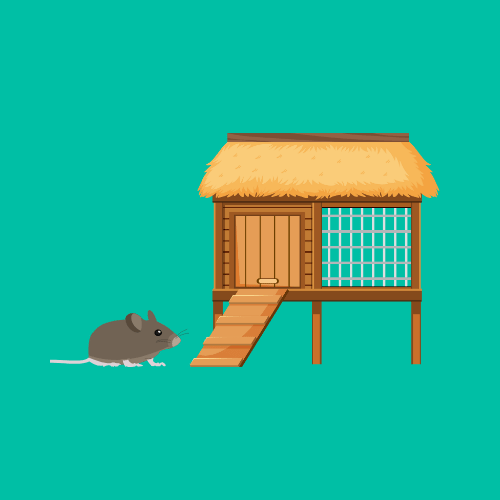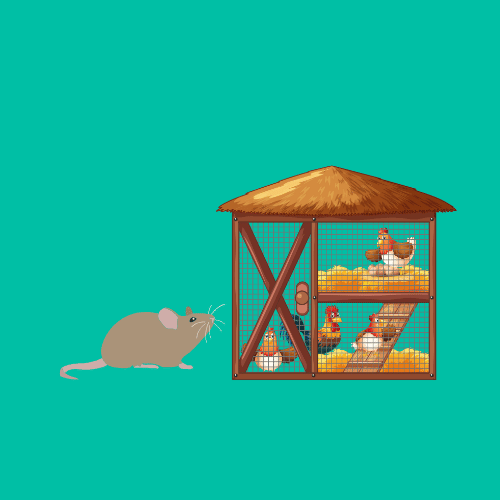Signs of Mice in Chicken Coop [And How to Deal with Them]

A chicken coop is a haven for your flock—but it can also attract unwanted guests like mice.
These tiny intruders can cause big problems, from stealing chicken feed to spreading disease. Spotting the signs of a mouse infestation early can save you time, money, and stress.
Here’s how to tell if mice have moved into your coop and what you can do about it.
Get our Gardening Buddy and find veggies that fit your conditions best.
You Can Grow It!
Why Mice in Your Chicken Coop Are a Problem
While mice may seem harmless, they bring significant risks to your chickens and their environment:
- Disease Transmission: Mice carry diseases like salmonella and hantavirus, which can harm your flock and your family.
- Feed Loss: Mice raid chicken feed, leading to waste and contamination.
- Coop Damage: Rodents chew through wood, insulation, and even wires, causing structural issues.
- Predator Attraction: Mice can attract larger predators, such as snakes or weasels, to the coop.
Check out: Top plants that deter rodents.

Top Signs of Mice in Your Chicken Coop
Droppings in the Coop
One of the easiest ways to spot a mouse problem is by finding their droppings. Mice leave small, dark, pellet-shaped droppings, often near food sources, nesting areas, or along coop walls.
Where to Check:
- Feed bins and feeders
- Nesting boxes
- Corners and dark areas
Gnaw Marks on Feed Bags or Wood
Mice constantly chew to keep their teeth sharp. You may notice gnaw marks on feed bags, wooden coop walls, or even plastic containers. Damaged feeders or spilled feed are also strong indicators of rodent activity.
Why It Matters:
Chewed materials can contaminate food and compromise the coop’s structure, making it less safe for your flock.
Holes or Burrows Around the Coop
Mice create small holes to enter the coop or burrow nearby. Check for:
- Holes in the ground near the coop foundation.
- Small gaps in walls or flooring that could serve as entry points.
Pro Tip:
Seal any gaps larger than a pencil to prevent mice from sneaking in.
Unusual Noises at Night
Mice are nocturnal, so you’re more likely to hear them scurrying or scratching in the coop after dark. If you notice unusual activity during evening checks, it’s worth investigating further.
Missing or Contaminated Chicken Feed
If your chickens seem to be eating less than usual, but their feed is disappearing quickly, mice could be stealing it. Mice are also known to urinate in feed, which can lead to contamination and illness in your flock.
How to Spot It:
- Check for spilled or scattered feed around feeders.
- Look for signs of tampering, like chewed edges on feeders.
Nesting Materials in the Coop
Mice use soft materials like feathers, straw, and shredded paper to build nests. If you notice small piles of these materials in unusual places, it’s a clear sign that mice are nesting in your coop.
Common Nesting Spots:
- Underneath nesting boxes
- In corners or hidden crevices
- Inside bedding materials
Stressed or Unwell Chickens
Chickens may become agitated or stressed if mice are present. Signs of stress include:
- Reduced egg production
- Restlessness in the coop
- Pecking or aggression toward each other
Mice can also introduce mites or lice, which further harm your flock.

How to Handle Mice in Your Chicken Coop
- Clean Thoroughly: Remove droppings, spilled feed, and nesting materials. Disinfect the area to eliminate odors that attract rodents.
- Seal Gaps and Holes: Use hardware cloth or steel wool to block entry points. Avoid using foam or soft materials that mice can chew through.
- Secure Feed and Water:
- Store feed in metal or rodent-proof containers.
- Use feeders designed to minimize spillage.
- Remove leftover feed each night to reduce temptation.
- Set Traps:
- Use snap traps or humane traps outside the coop to catch mice.
- Avoid using poison, as it can harm your chickens or other animals.
- Encourage Natural Predators: Chickens themselves can eat mice, but you can also attract barn owls or other natural predators to help control the population.

Preventing Future Mice Infestations
- Use Hardware Cloth: Cover vents, windows, and other openings with hardware cloth to block entry points.
- Maintain a Clean Coop: Regularly clean bedding, remove waste, and check for food spillage.
- Raise the Coop: Elevating your coop off the ground makes it harder for mice to burrow underneath.
- Rotate Bedding: Changing bedding frequently reduces hiding spots and nesting materials.

Find the Vegetables that are Best for you
Mice in your chicken coop can cause more trouble than you think. By keeping an eye out for the signs and taking swift action, you can protect your flock and their home from these pesky intruders.
Stay vigilant, keep your coop clean, and make it as uninviting as possible for rodents. Your chickens will thank you for it!
Get our Gardening Buddy and find veggies that fit your conditions best.
You Can Grow It!
Partners and Sponsors
We are forever grateful to our partners and sponsors. Send an email to team @ strongecho.com and let’s see how we can grow each other’s impact!





